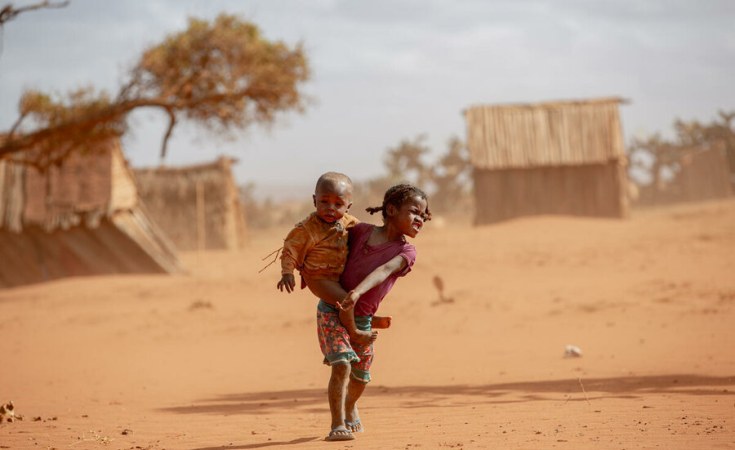A new report by the World Bank has revealed that the United Nations' (UN) goal of ending extreme poverty by 2030 is no longer feasible due to a combination of factors, including wars, huge debt, climate crisis and the COVID-19 pandemic.
According to the 'Poverty, Prosperity, and Planet Report', the global goal of ending extreme poverty -- defined as $2.15 per person per day, by 2030 -- is out of reach.
Ending extreme poverty by 2030 is one of UN's Sustainable Development Goals (SDGs).
Extreme poverty, the report said, remained concentrated in countries with historically low economic growth and high levels of fragility, many of which are in sub-Saharan Africa.
It explained that it could take three decades or more to eliminate poverty at this threshold, which is relevant primarily for low-income countries.
Almost 700 million people - 8.5 per cent of the global population - live today on less than $2.15 per day, with 7.3 per cent of the population projected to be living in extreme poverty in 2030.
While it is no longer feasible to end extreme poverty by 2030, the report noted that it would take even longer - more than a century - to meet a more ambitious objective of raising incomes above the $6.85 a day deemed to be the poverty threshold for upper middle-income countries.
Today, 44 per cent of the world's population lives on less than $6.85 per day, the poverty line for upper-middle-income countries. The number of people living under this poverty line has barely changed since 1990 due to population growth.
The bank defines upper middle-income economies as those with income a head of between $4,466 and $13,845 a year in a group of countries that include Argentina, Botswana and China.
Currently, 3.5 billion people - almost half the world's population - live on less than $6.85 a day and the report said population growth meant the number of poor people on this measure of poverty had barely changed since 1990.
The report stated that there had also been little progress on another development goal - to reduce inequality. While the number of countries with especially large gaps between rich and poor had declined from 66 to 49 over the past decade, the percentage of people living in countries with high levels of inequality had remained unchanged at 22 per cent.
These countries were concentrated in Latin America, the Caribbean and sub-Saharan Africa.
Commenting on the new report, World Bank Senior Managing Director, Axel van Trotsenburg, said: "After decades of progress, the world is experiencing serious setbacks in the fight against global poverty, a result of intersecting challenges that include slow economic growth, the pandemic, high debt, conflict and fragility and climate shocks.
"Amid these overlapping crises, a business-as-usual approach will no longer work. We need a fundamentally new development playbook if we are to truly improve people's lives and livelihoods and protect our planet."
The Chief Economist of the World Bank Group and Senior Vice-President for Development Economics, Indermit Gill, said: "Low-income countries and emerging market economies will do well to acknowledge the inevitability of tradeoffs among these objectives, but also to appreciate some synergies.
"Policies to reduce air pollution, for example, contribute both to climate and developmental goals. Sustained investments in education and health provide higher poverty and prosperity related payoffs in developing countries than do tax-financed social assistance programmes.
"And well-executed government initiatives to increase the capacity of farmers to adopt new, climate-smart, technologies can reduce poverty, spread prosperity, and preserve the planet."
Progress in reducing the Global Prosperity Gap, the World Bank's new measure of shared prosperity, has stalled since the COVID-19 pandemic, highlighting a slowdown in inclusive income growth over this period.
On average, incomes around the world would have to rise five-fold today to reach the level of $25 per person per day, the minimum prosperity standard for high-income countries.
The number of economies with high income inequality has declined over the past decade. Yet, 1.7 billion people - 20 per cent of the global population - still live in high-inequality economies, concentrated mostly in Latin America and the Caribbean and Sub-Saharan Africa.
High inequality reflects a lack of opportunities for socioeconomic mobility, which hinders prospects for inclusive growth and poverty reduction.
Nearly one in five people globally are likely to experience a severe weather shock in their lifetime from which they will struggle to recover. Almost all those exposed to extreme weather events in sub-Saharan Africa are at risk of experiencing welfare losses due to their high vulnerability.
The report noted that future poverty reduction requires economic growth that is less carbon emissions-intensive than in the past.
It explained that reducing extreme poverty, measured at $2.15 per day, would not come at a high cost for the planet, since the poorest countries contribute relatively little to emissions.
However, reducing poverty at the higher standard of $6.85 per day - the poverty line typical of upper-middle-income countries - could lead to a significant increase in emissions, it said, adding that each country needs a tailored approach based on their income-level, prioritizing certain policies and managing synergies and trade-offs across goals.
"Low-income countries should prioritize poverty reduction by delivering economic growth via greater investment in job creation, human capital, access to services and infrastructure, while improving resilience.
"Middle-income countries should prioritize income growth that decreases vulnerability to shocks, along with policies to reduce the carbon intensity of growth. In high-income and upper-middle-income countries, where carbon emissions are high, the focus should be on cutting emissions while finding ways to alleviate job losses and other short-term costs that can result from such cuts, particularly for people living in or vulnerable to poverty.
"Strengthening international cooperation and boosting finance for development are also critical for a successful transition towards more sustainable, inclusive and resilient economies," the report stressed.


